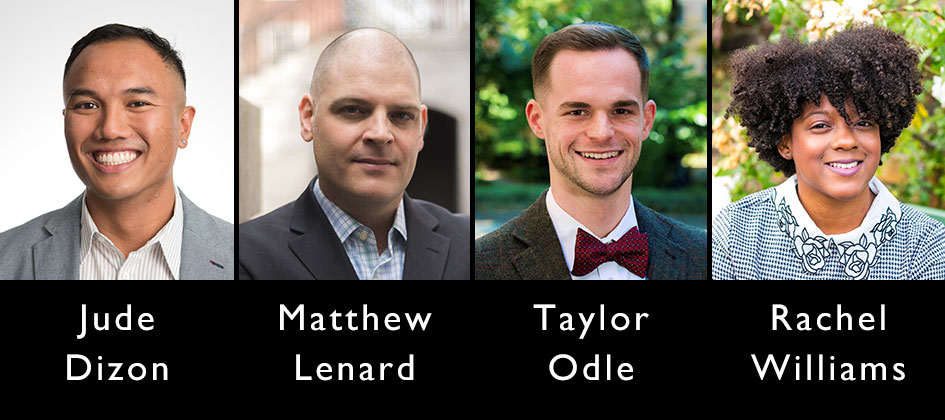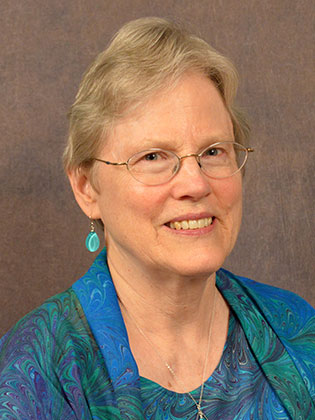
July-August 2020 Newsletter
SREE Summer Fellows Underway
SREE, in collaboration with Grantmakers for Education, has launched its second year of the Summer Graduate Student Research Fellows Program, connecting GFE members with SREE student members to advance high-quality education research. Response to the program was incredibly strong. Four fellows have been selected and are spending the summer conducting research for their philanthropic "client," answering a real-world research question that will inform the work of these organizations.
The four fellows, with their clients and projects, are:
- Taylor Kincaid Odle, University of Pennsylvania, partnered with Ascendium, to investigate specific strategies that are being currently tested or deployed to reengage some college, no degree, and adult learners;
- Rachel Elizabeth Williams, University of California - Berkeley, partnered with Ascendium, to investigate best practices in grant making in relation to continuous improvement;
- Matthew Lenard, Harvard University, partnered with the Bill and Melinda Gates Foundation and the Kresge Foundation, to investigate how higher education institutions and direct service workforce nonprofits use data to align their education and training programs to local labor markets; and
- Jude Paul Matias Dizon, University of Southern California, partnered with the Learning, Evaluation and Data (LEAD) Impact Group, to investigate the gender gap in colleges.
 The fellows' research will be shared with their clients as well as the larger education research and education philanthropy communities. The projects will be completed by September 30. The fellows' research will be shared with their clients as well as the larger education research and education philanthropy communities. The projects will be completed by September 30.
Save the Dates for SREE's Fall 2020 Ask Me Anything Sessions
 After a successful pilot in June, SREE plans to hold a series of monthly Ask Me Anything Sessions, with the first two scheduled for Noon EDT on September 25 and October 30. Hosted by SREE Board member, James Kim, the purpose of the Ask Me Anything hour is to provide an informal opportunity for SREE members to be able to have the kind of conversations that might have taken place at the annual spring conference over lunch, after a session, or at a reception. Specific topics and speakers will be announced in the coming weeks. After a successful pilot in June, SREE plans to hold a series of monthly Ask Me Anything Sessions, with the first two scheduled for Noon EDT on September 25 and October 30. Hosted by SREE Board member, James Kim, the purpose of the Ask Me Anything hour is to provide an informal opportunity for SREE members to be able to have the kind of conversations that might have taken place at the annual spring conference over lunch, after a session, or at a reception. Specific topics and speakers will be announced in the coming weeks.
Working on Pandemic Related Research?
Are you currently conducting, or have you previously conducted, research on cognition, distance learning, or educational technology that is relevant in this time of distance learning? If so, SREE wants to hear from you! There is a hunger for evidence in these areas; we’d like to help share our community’s relevant research. Please send an email to [email protected].
SREE 2021 and 2022 Conferences Scheduled for September
SREE is moving its annual spring conference to fall next year. Please mark September in your calendars now. Timelines for submissions will be released this fall. The dates are:
September 26-29, 2021
September 21-24, 2022
The in-person portion of the events will take place at the Renaissance Arlington Capitol View Hotel in Arlington, Virginia.
Members in the News
 SREE Co-Founder, Barbara Foorman, has retired from Florida State University. Barbara served as a SREE Board Member from 2006-2013. She continues to work for Florida State University part time and is also doing some consulting work. SREE Co-Founder, Barbara Foorman, has retired from Florida State University. Barbara served as a SREE Board Member from 2006-2013. She continues to work for Florida State University part time and is also doing some consulting work.
Institutional Member Corner: Michigan State University
How did Michigan school districts plan to educate students during COVID-19? An analysis of district Continuity of Learning plans
In this brief, we report our findings from EPIC’s analysis of every Michigan school district’s Continuity of Learning (COL) plan authored in the spring of 2020 just as schools transitioned away from face-to-face instruction into distance learning. This brief provides insights about how districts initially planned to provide instruction during the pandemic, how they monitored student learning, and what services and supports they provided to students overall and for special populations.
How did Michigan educators respond to the suspension of face-to-face instruction due to COVID-19? An analysis of educators’ responses to the 2020 EPIC COVID-19 survey
To begin to understand how Michigan educators responded during the transition to distance learning, the Education Policy Innovation Collaborative (EPIC) conducted a survey of K-8 teachers and principals in traditional public schools (TPSs) and charter schools (PSAs) across the state. The survey asked educators about how they were engaging with students, the challenges they were facing, the resources and supports they were using, and their concerns about the impacts of COVID-19.
Michigan State University announces new fellowship program.
Michigan State University is happy to announce a new fellowship program for doctoral students interested in the intersection of education policy evaluation and implementation, and social science research beginning in the 2021-22 academic year. The Michigan State Interdisciplinary Training in Education and Social Science (MITTENSS) fellowship is funded by a $4 million grant from the US Department of Education’s Institute of Education Sciences. The fellowship will include enhanced stipends, research support, and apprenticeships with MSU researchers and education practitioners. Prospective fellows apply to complete a Ph.D. in one of five programs – education policy; political science; higher, adult, and lifetime education; economics; or K-12 education. In addition to the requirements of their doctoral program, those chosen to become MITTENSS Fellows will also complete a new doctoral specialization in education and social sciences, gain access to high-profile visiting education scholars from around the country, professional development, research workshops, and one-on-one mentorship with members of our core faculty. Fellowship eligibility is restricted to US citizens or permanent residents. Interested applicants should contact Kayon Hall at [email protected] for more information.
Institutional Member Corner: RAND
Are you an education researcher? Are you in school to become one?
Are you interested in receiving a small scholarship to conduct your own research using survey data from one of the largest, high-quality data sets of U.S. school leaders and teachers?
RAND Corporation is making scholarships available to support early-career researchers from underrepresented groups or at under-resourced institutions to use American Educator Panels (AEP) data. This effort, funded by the Bill & Melinda Gates Foundation, is intended to build quantitative analytic capacity among a diverse group of researchers and to ensure analyses reflect a wide range of perspectives. AEP Scholars will have opportunities to interact with one another and with RAND researchers as part of a cohort of scholars who are interested in using survey data to address crucial education policy questions.
The RAND AEP team has administered surveys on a wide range of education topics of national import. Past surveys have included topics such as social and emotional learning, COVID-19, disabilities and special education, and planning for postsecondary success. Browse published RAND research that used AEP data. See a partial list of completed AEP surveys in the AEP Data Portal.
The AEP is a unique resource that, among other benefits, offers:
- High-quality data from scientifically drawn, probability-based samples of teachers and principals to provide nationally representative estimates
- Ability to examine results for subgroups of teachers and principals, such as those in elementary, middle, or high schools, and those serving majorities of low-income or high-income students
- Opportunity to access and share data with the broader research community
More about the AEP Scholarship:
By conducting relevant and timely analyses with AEP data that addresses their research questions, scholarship recipients will contribute to research that informs policies and practices that benefit all youth.
Scholarships of $5,000 can be used at scholars’ discretion. Potential scholarship uses include purchase of restricted AEP data or other needed resources, such as software.
Application deadline: The first round of applications is due by end of day September 30, 2020. Future rounds may be opened pending availability.
Who should apply:
Early-career scholars, current graduate students enrolled in a doctoral, professional, or master’s degree programs at U.S.-based colleges or universities, or people awarded one of these degrees within seven years who also fit at least one of the following criteria:
- From underrepresented groups in higher education (e.g., Black or African American, Latinx, or American Indian students; first-generation college students)
- From under-resourced institutions that may be unable to provide the support needed to access and analyze the data
- From minority-serving institutions
Scholarship recipient responsibilities:
- Recipients will engage in multiple activities throughout the year of award to ensure progress and success. At a minimum, recipients will attend a virtual orientation, submit a research plan for their project, attend virtual check-in meetings with RAND, and present their research at a virtual final convening of scholarship recipients.
Award selection:
- RAND will review applications to determine eligibility and completeness. A group of RAND education researchers and AEP team members will review qualifying applications to select recipients. All applicants will receive email notice of their application status.
Additional details and instructions on how to apply for the scholarship can be found on the AEP website at www.rand.org/aep-scholarship. Please note you will need to register for the AEP Data Portal to access the application.
Upcoming Events
Democratizing Evidence in Education: The Search for Balance between Inclusivity and Expertise
Professional Development Session: August 19, 1:00-2:15 PM EDT
Unpacking the Logic Model: A Discussion of Mediators and Antecedents of Educational Outcomes from the Investing in Innovation (i3) Program
Symposium: September 9, 1:00-2:00 PM EDT
Weighting in Multilevel Models
Single Paper Presentation: September 23, 1:00-1:30 PM EDT
Ask Me Anything
September 25, Noon-1:00 PM EDT
Reaching Farther: Combining Data Sources to Extend and Enrich Research Findings
Symposium: September 30, 1:00-2:00 PM EDT
Ask Me Anything
October 30, Noon-1:00 PM EDT
|